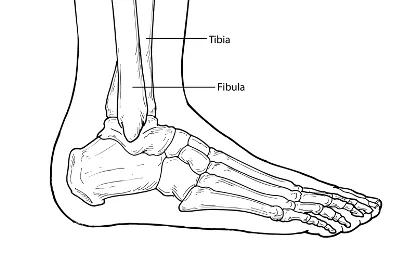Ankle Fracture Healing begins with understanding what an ankle fracture actually is. An ankle fracture refers to a partial or complete break in any of the bones forming the ankle joint—most commonly the tibia, fibula, or talus. These injuries can vary significantly in severity, ranging from small avulsion fractures (where tiny pieces of bone are pulled off) to more complex and severe breaks involving multiple bones and joint instability.
It’s easy to confuse a fractured ankle with a sprain due to overlapping symptoms like swelling and pain. However, accurate and timely diagnosis is crucial for proper treatment and successful Ankle Fracture Healing. In some cases, both injuries can occur simultaneously, further complicating the condition.
Common Symptoms of an Ankle Fracture
Recognizing the symptoms is a critical first step in promoting effective Ankle Fracture Healing. Typical signs include:
- Sudden, intense pain at the site of injury
- Swelling and bruising around the ankle
- Inability to bear weight or walk normally
- Deformity or misalignment in the ankle structure
- Tenderness when touching the area
If any of these symptoms are present after an injury, it’s important to seek medical attention immediately.
Causes and Risk Factors
Ankle fractures usually occur due to:
- Falls or slips
- Sports injuries
- Car accidents
- Twisting or rotating the ankle awkwardly
People with osteoporosis or poor bone density are at increased risk, as are athletes and individuals with physically demanding lifestyles.
Diagnosis and Initial Assessment
To ensure optimal Ankle Fracture Healing, a thorough diagnosis is essential. Doctors typically perform:
- A physical examination
- X-rays
- CT scans or MRI (for complex cases)
Proper imaging helps determine the type and extent of the fracture, which guides the treatment plan.
Treatment Options for Ankle Fractures
Effective Ankle Fracture Healing depends on the nature of the fracture. Treatment may include:
- Non-Surgical Methods: Rest, ice, compression, and elevation (RICE), immobilization with a cast or brace, and physical therapy
- Surgical Intervention: Required for displaced or complex fractures; may involve screws, plates, or rods to stabilize the bones
Recovery time can vary, but early intervention is key to preventing long-term complications.
Phases of Ankle Fracture Healing
- Inflammatory Phase (0–2 weeks): Pain and swelling are at their peak. The body begins to clear damaged cells.
- Reparative Phase (2–6 weeks): New bone tissue starts to form.
- Remodeling Phase (6+ weeks): The bone continues to strengthen and reshape itself over time.
Understanding these stages helps manage expectations and track progress.
Importance of Physical Therapy
Physical therapy plays a vital role in Ankle Fracture Healing. It helps:
- Restore mobility and strength
- Reduce stiffness and pain
- Prevent future injuries
Exercises are introduced gradually and tailored to the individual’s healing stage.
Nutrition and Lifestyle Tips for Faster Healing
Support your Ankle Fracture Healing journey with:
- Calcium and Vitamin D-rich foods
- Adequate protein intake
- Staying hydrated
- Avoiding smoking and excessive alcohol
These lifestyle choices can accelerate recovery and improve bone health.
When to Resume Activities
Returning to regular activities depends on:
- The type of fracture
- Healing progress
- Doctor’s recommendations
Overexertion too soon can delay Ankle Fracture Healing, so patience is essential.
Complications to Watch For
While most people recover fully, complications can arise, such as:
- Improper bone alignment
- Chronic pain or stiffness
- Arthritis in the ankle joint
- Infection (post-surgery)
Regular follow-ups with your doctor help detect and manage issues early.
Final Thoughts on Ankle Fracture Healing
Ankle Fracture Healing is a multi-stage process that requires proper care, rest, and rehabilitation. With early diagnosis, the right treatment plan, and a proactive approach to recovery, most individuals can return to their normal routines without long-term effects. Always consult with your healthcare provider for personalized guidance and support throughout your recovery journey.




